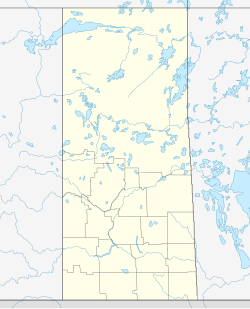Birch Hills is a town located in Saskatchewan, Canada. It is southeast of Prince Albert and the reserve of Muskoday First Nation. Directly to the west is the village of St. Louis, and to the east is Kinistino. It is surrounded by, but not part of, the Rural Municipality of Birch Hills No. 460.
Birch Hills | |
|---|---|
Town | |
| Coordinates: 52°59′00″N 105°26′00″W / 52.983333°N 105.433333°W | |
| Country | Canada |
| Province | Saskatchewan |
| Census division | 15 |
| Rural Municipality | Birch Hills |
| Post office established | 1895 |
| Incorporated (Village) | 1907 |
| Incorporated (Town) | 1960 |
| Government | |
| • Mayor | Stewart Adams |
| • Town Manager | Tara Gariepy |
| • Governing body | Town council |
| Area | |
• Total | 2.27 km2 (0.88 sq mi) |
| Population (2011) | |
• Total | 1,064 |
| • Density | 468.4/km2 (1,213/sq mi) |
| Time zone | CST |
| Postal code | S0J 0G0 |
| Area code | 306 |
| Highways | Highway 3 |
| Website | birchhills |
| [1][2][3][4] | |
The community takes its name from hills in the area, which were once heavily treed with birches that were used in manufacturing birch bark canoes during the fur trade era of the 18th century. The countryside around Birch Hills is part of the aspen parkland biome.
History
editSituated in an area settled primarily by Norwegian, British and Anglo-Metis peoples, Birch Hills became a village in 1907 and reached town status in 1960. Unlike many other agriculturally based towns, it continues to grow due to its position as a satellite community of Prince Albert.
Demographics
editIn the 2021 Census of Population conducted by Statistics Canada, Birch Hills had a population of 1,066 living in 450 of its 475 total private dwellings, a change of 3.2% from its 2016 population of 1,033. With a land area of 2.39 km2 (0.92 sq mi), it had a population density of 446.0/km2 (1,155.2/sq mi) in 2021.[5]
| 2021 | 2011 | |
|---|---|---|
| Population | 1,066 (+3.2% from 2016) | 1,064 (+13.8% from 2006) |
| Land area | 2.39 km2 (0.92 sq mi) | 2.27 km2 (0.88 sq mi) |
| Population density | 446.6/km2 (1,157/sq mi) | 468.4/km2 (1,213/sq mi) |
| Median age | 41.6 (M: 38.4, F: 44.0) | 42.1 (M: 40.2, F: 43.9) |
| Private dwellings | 475 (total) 450 (occupied) | 440 (total) |
| Median household income | $78,500 |
Transportation
edit- Birch Hills Airport – Municipal airport
- Highway 3
- Highway 25
Notable people
edit- Earl Thomson won a gold medal for Canada at the 1920 Olympics in the 110 metres hurdles.
- Marshall Johnston was an NHL player, scout, coach, and general manager. He is currently the Director of Professional Scouting for the Carolina Hurricanes.
- John Richard Parish Taylor, politician
See also
editReferences
edit- ^ "2011 Community Profiles". Statistics Canada. Government of Canada. Archived from the original on 26 December 2018. Retrieved 9 April 2014.
- ^ National Archives, Archivia Net. "Post Offices and Postmasters". Archived from the original on 6 October 2006. Retrieved 15 July 2014.
- ^ Government of Saskatchewan, MRD Home. "Municipal Directory System". Archived from the original on 15 January 2016. Retrieved 15 July 2014.
- ^ Commissioner of Canada Elections, Chief Electoral Officer of Canada (2005). "Elections Canada On-line". Archived from the original on 21 April 2007. Retrieved 15 July 2014.
- ^ "Population and dwelling counts: Canada, provinces and territories, census divisions and census subdivisions (municipalities), Saskatchewan". Statistics Canada. 9 February 2022. Retrieved 1 April 2022.
- ^ "2021 Community Profiles". 2021 Canadian census. Statistics Canada. 4 February 2022. Retrieved 19 October 2023.
- ^ "2011 Community Profiles". 2011 Canadian census. Statistics Canada. 21 March 2019. Retrieved 17 July 2014.
- ^ "2006 Community Profiles". 2006 Canadian census. Statistics Canada. 20 August 2019.
- ^ "2001 Community Profiles". 2001 Canadian census. Statistics Canada. 18 July 2021.
External links
edit| North: Muskoday First Nation | ||
| West: St. Louis | Birch Hills | East: Weldon |
| South: Jumping Lake |

